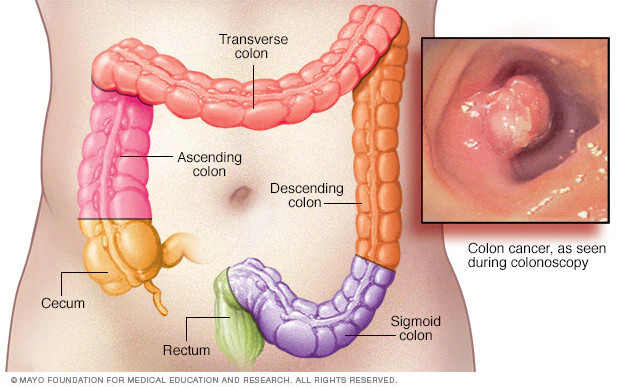What Are the Symptoms of Colon Cancer? How Should We Respond?

Find most of the essential knowledge about colon cancer here.
Q. I feel a mild pain in my lower abdomen, a sense of bloating, and frequent gas. Even after a bowel movement, I still feel like I haven’t emptied my bowels completely. I also pass gas too frequently throughout the day.
One of the most dangerous aspects of colon cancer is bowel obstruction. As a tumor grows, it can block the intestines, making bowel movements difficult. In non-tumorous cases, there are different types of polyps:
- Inflammatory polyps
- Juvenile polyps
- Hyperplastic polyps
In the case of adenomas, they are classified into three types based on their malignant potential. While adenomas are still benign, they have a high probability of developing into adenocarcinoma.
“What are you saying?”
Yes, it might sound complicated, right?
There are various symptoms of colon cancer, including bloating, abdominal pain, bloody stool, diarrhea, and constipation. However, colon cancer is not as easily contracted as some might think.

Colon Cancer Symptoms?
Do you know what the colon is? It’s just another part of our intestines. Our digestive organs do not have sensory nerves. So, can we actually feel pain?
Most of the time, we don’t. Symptoms such as abdominal pain due to increased abdominal pressure or bloody stool typically appear when the disease has already progressed beyond stage 3.
To put it bluntly, by the time symptoms appear, colon cancer is already in an advanced stage. So, how can we deal with it?
The only real answer is regular check-ups.
“But what if I feel like I might have colon cancer even without a check-up?”
How exactly do you feel that?
What I want to emphasize is not the symptoms themselves, but avoiding unnecessary panic.
Colon cancer symptoms can often resemble common digestive issues such as indigestion, irritable bowel syndrome, or hemorrhoids. This similarity increases the likelihood of overreaction.

Who Should Be Concerned?
- If you experience sudden and persistent diarrhea or constipation for several months
- Some people have always had digestive issues due to conditions like irritable bowel syndrome or Crohn’s disease. These are chronic conditions that don’t heal easily. However, if someone who usually has a strong digestive system suddenly experiences prolonged discomfort, that’s a red flag.
- If you are over 40
- Although colon cancer can occur in younger people, it is extremely rare. After 40, if you experience persistent digestive issues, bloody stools, or mucus in your stool, it’s time to get checked. Prolonged exposure to alcohol, smoking, and an unhealthy lifestyle increases the risk.
- If you have bloody stools
- Although not all colon cancer patients experience bloody stools, if you notice it in combination with points 1 and 2, you should take it seriously.
- Unexplained weight loss
- If you are losing weight rapidly without changes in diet or exercise, and it is accompanied by symptoms from points 1, 2, or 3, consult a doctor immediately.
- Persistent fatigue
- About 70% of our energy absorption happens in the intestines. If you feel persistently fatigued along with the above symptoms, it’s time for a check-up.
“Could frequent gas be a sign of bowel obstruction due to colon cancer?”
The theory is that as polyps grow, they block the bowel, leading to trapped gas and incomplete evacuation. However, this is quite rare.
If you truly have colon cancer, other abnormal bowel changes will accompany the gas issue. Frequent gas alone is not enough to suspect colon cancer.
If none of the above symptoms (points 1-5) apply to you, the probability of having colon cancer is very low. However, it is impossible to be 100% certain without a medical examination.
Frequent gas can also be caused by irritable bowel syndrome, Crohn’s disease, stress, or nervous tension. If you are feeling particularly anxious or stressed, try evaluating your emotional state. Also, forcing yourself to pass gas due to bloating can actually increase pressure, making it worse.
The Only Accurate Diagnosis: Colonoscopy
There is no way to definitively diagnose colon cancer without a colonoscopy.
Healthy Habits for Better Digestion
Gas, bowel movements, and burping should never be forced. If you constantly feel the need to force them, reconsider your habits. Instead, try breath control techniques:
- If you feel bloated, take deep breaths to help with gas regulation.
- If you feel the need to burp, adjust your breathing rather than forcing it.
Breathing plays a significant role in pressure regulation inside the body. Using deep breathing techniques is far more effective than forcing your body to expel gas unnaturally.

Additional Information
For stage 3 colon cancer, over 50% of patients achieve remission if they endure chemotherapy for six months. Compared to other cancers, colon cancer has a relatively high survival rate:
- Stages 0-1: 90-100% five-year survival rate
- Stage 2: 70-85% five-year survival rate
- Stage 3: 50-60% five-year survival rate
However, as with all cancers, there is no guaranteed cure. Additionally, colon cancer has a 52% chance of spreading to the liver, as blood from the intestines flows through the portal vein to the liver.
If colon cancer runs in your family, proactive screening and a healthy lifestyle are the best preventive measures.


